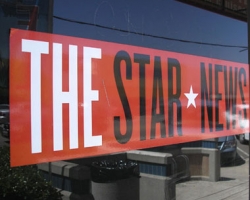Michael McCrerey, a 66-year-old Irish man, stands strong at 6 foot 4 inches. Six years ago, however, he was thin, weak and dying from liver disease caused by years of rough living and drinking, he said.
McCrerey now carries a healthy liver donated by Mario Pinedo, a 39-year-old man who died four years ago from a brain aneurysm.
Pinedo was born in Tijuana and settled in National City where he opened Carrera’s Auto Detail. In July 2005 he went to the DMV to renew his license and register as an organ donor, but his parents were against it, said his sister Leticia Silva, owner of Ace Radiator in National City.
He died seven months later.
Pinedo had given his liver, lungs, arteries and heart valves, Silva said.
“This is something he had given thought to, obviously, and something he really wanted to do,” she said. “I feel so proud of him.”
Lifesharing, a non-profit organ and tissue recovery organization, recently celebrated its roughly 7 millionth registered organ donor, but there is still a need for more, said Sharon Ross, Lifesharing’s community outreach manager.
According to a Lifesharing fact sheet, only one in four people check the “Yes, I want to be a donor” box at the DMV, which is where 98 percent of registrations come from.
Chula Vista and San Ysidro have the lowest registration numbers in San Diego, Ross said, but not by much.
“I think we’re not educating, especially with Hispanic populations,” Silva said.
A lot of people think the Catholic Church is against organ donation, she said. And while South County is mostly Hispanic and often Catholic, education is the best solution to correct misunderstandings.
Catholicism does not oppose organ donation, according to Donate Life, a San Diego Web site. In fact, many religions leave the choice up to the individual. Only Shinto and the Gypsy culture oppose it.
After Pinedo’s death, his parents did not want the removal of organs to take place, delaying the liver transplant to McCrerey. It took them an extra day to think about it, but they came around, Silva said.
“I was diminishing in muscle mass, weight and strength,” McCrerey said. “I think the only thing that was fairly strong was my attitude.”
After the transplant, McCrerey wrote a letter to Pinedo’s family, offering his condolences and suggesting they meet. But he waited until he had fully recovered.
“You don’t want to write a letter to a family that’s already lost someone and then have them lose you too,” he said.
Receiving the letter was a form of relief for Silva.
“For me it was healing, to actually know (his death) wasn’t in vain,” she said. “He was able to save lives, to keep families together.”
The families met Nov. 15, 2008, and were happy to meet McCrerey, Silva said.
Since 1995, Lifesharing has saved 5,200 lives in San Diego, Ross said. If organs cannot be used, which can save up to eight lives, tissue can be donated, Ross said. Healing up to 50 lives, tissue donation includes skin, bones, heart valves, corneas, veins, ligaments and nerves.
After someone receives an organ transplant, the body will see it as foreign and the recipient must always be monitored and take medication, Ross said.
People often rule themselves out because they are too sick or too old, but they should still register, she said.
Rita, McCrerey’s wife, jokingly said it was interesting to see her husband receive the liver from a smaller man and from a different ethnicity. Silva laughed and said Pinedo was only 5 foot 4 inches, quite different than McCrerey.
“We’re all connected,” Rita McCrerey said.

